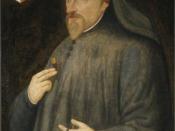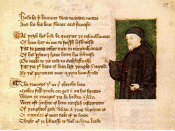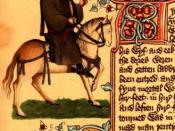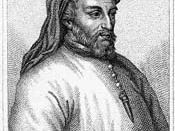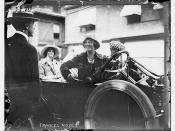Geoffrey Chaucer (1340-1400) Geoffrey Chaucer led a truly remarkable life. He was one of the greatest English poets and he had accomplished a lot, from being "The Father of English Poetry"� to serving the royal family. Chaucer marks the time period when the English language became derived from French. Not only did he originate his own language, which is referred to as The Chaucerian Language, but he also came very close to creating a new nation. His language, however, would frequently be compared to that of Shakespeare. Both Shakespeare and Chaucer thought of their own creative ideas to incorporate within their poems. Chaucer had a tremendous effect on the world of poetry in numerous ways, mainly with his alterations of the English language, but also with the introduction of a seven-line stanza in iambic pentameter. The literary device first appeared in his poem, "Trolius and Criseyde."� It is apparent in his poems that Chaucer was considered a "humorist and humanist,"� because he had two sides to him.
He expressed both the comical and serious aspects of his personality.
Chaucer was born and raised on Thames Street in London, England around 1340. The name, Chaucer, comes from the French word Chausser, which means the maker of footwear. He lived during the medieval English age. During that time, Chaucer was a very ordinary name, because it was related to a mutual trade. His religion was Catholic. While attending the Latin grammar school of Saint Paul's Cathedral, he studied law. The Chaucer family was very elaborate, and there are barely any known facts about them. His parents were important London wine merchants. His grandfather, Robert le Chaucer, was connected with the imports of wine as well. His grandmother, Mary le Chaucer, married at least twice. All the information about his family comes from legal documents. It is known that Chaucer was fluent in French and he spoke some Latin and Italian. From 1359-1360, he served in the army of Edward III in France, where he was later seized. He went on various political and military expeditions all over the world. In 1366, he married Philippa de Roet, the daughter of Sir Payne Roet. They had two children by the names of Thomas and Lewis. Several years later, in 1387, Philippa de Roet passed away of an unknown cause. The following year, Chaucer moved from London to Greenwich where he became justice of the peace and representative to Parliament. Throughout his life, he traveled on several missions. He went to France around 1360, Spain in 1366, and Italy in 1372. Then he moved into a house near St. Mary's Chapel in the garden of Westminster Abbey where he spent his remaining days.
He achieved a tremendous amount throughout his life. He served in The Hundred Year's War between England and France, which took place from 1359-1360. After the fighting came to an end, he was a messenger between France and England during the peace negotiations. A few years later, he was a member of the royal family, which includes Edward III, The Countess of Ulster, Richard II, and The Earl of Derby. In 1385, he was appointed a Justice of the Peace for Kent. In addition, he also served in the Parliament as a knight for one year. It came as a shock to many hearing the fact that Chaucer was accused of raping a woman by the name of Cecily Chaumpaigne. Luckily, soon after, he was released from all charges and his actions. Aside from that, he maintained close relations with his family. It is unbelievable how he managed to be a soldier, a member of the royal family, travel on tactful missions, be a justice of the peace, a member of Parliament, and manage to write all the magnificent poetry that he did.
Chaucer wrote several short poems, long poems, and tales as well. His longer ones, however, are the most known and popular. Among his short poems are "The Complaint of Mars,"� Lack of Steadfastness,"� "The Former Age,"� and "The Treatise on the Astrolabe,"� which was solely dedicated to his children. In 1367, he wrote "The Book of Duchess,"� which was a 1300-line poem in which he included dream vision. In 1370, he started "The House of Fame,"� which was planned to be a 2000-line poem, but he never got the opportunity to finish it. His most significant accomplishments took place in the 1380's. He wrote "Parliament of Fowls,"� "The Consolation of Philosophy,"� "Trolius and Criseyde,"� "The Legend of Good Women,"� and most importantly, in 1387, he wrote "The Canterbury Tales."� Among all of his works, "The Canterbury Tales"� is his most famous and greatest literary achievement. It was one of the most important influences on the development of English literature. The tales were known to be a true masterpiece. He worked on it for over fourteen years, from 1387 to his death in 1400. He planned to have 120 tales, with each pilgrim telling four stories: two on their journey to Canterbury Cathedral and two on the way back home. In the prologue, he introduced 28 pilgrims. It starts with a group of 30 pilgrims gathering at the Tabard Inn in Southwark, which is located near London. His death took him away prior to the completion of the tales. Therefore, the pilgrims never reached Canterbury. It was composed of 18,000 lines of poetry. Beyond "The Canterbury Tales,"� "Trolius and Criseyde,"� was his next major work. It was a poem of over 8,000 lines. The story is about the Trojan prince, Trolius, who gets Criseyde, and then the Greek warrior, Diomede, takes her. The French poets Guillaume De Machaut and Jean Froissart influenced his earliest works. No matter what kind of composition Chaucer had written, it could clearly be told apart from most poets, because he had a special style of writing.
Chaucer's language was very unique, because he attempted to Europeanize English. That is what brought many people to like and admire him. He contributed a lot to the world of poetry and impacted the English language by being the first English poet to write in his own made up language. Chaucer would spell words the way that he thought made more sense and he had his own versification. However, his death came too quickly. He died on October 25, 1400 and he was buried in the Westminster Abbey. He was the first poet to be buried in the poets' corner. The eminence and quality of Chaucer's writing and poetry was acknowledged by other poets of his time, and has continued to be ever since his death. His works are still being studied today among many people, and will most likely continue to be admired and cherished for infinite years to come. Geoffrey Chaucer deserves the name, "The Father of English Poetry,"� because it suits him best as he had a vast influence on English poetry, and he would certainly be considered one of the best poets of all time.
